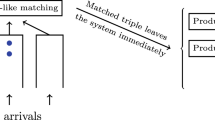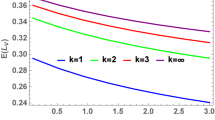Abstract
We provide an account of recent work that formulates and addresses problems that arise when employing wireless networks to serve clients that generate real-time flows. From a queueing systems perspective, these problems can be described as single-server problems where there are several customer classes. Customers balk when their delay exceeds a threshold. There are a range of issues that are of interest. One of the first such issues is to determine what throughput rate vectors are feasible, and to determine the server’s schedule. Another is to maximize a utility function of the departure rates of the customer classes.
Real-time flows have a delay bound for each of their packets. It is particularly challenging to provide delay guarantees for real-time flows in wireless networks since wireless transmissions are unreliable. We propose a model that jointly considers the delay bounds of packets, the unreliable wireless channels, and the throughput requirements of clients. We then determine the necessary and sufficient condition for feasibility of the client requirements. The analysis and condition are interesting since this problem gives rise to some new features concerning unavoidable idle times in a system. We further derive an efficient, nearly linear time algorithm for admission control, which precisely determines whether it is feasible to fulfill the requirements of all clients in the system. We also propose two on-line scheduling policies and prove that they can fulfill the requirements of all clients whenever that is feasible.
We next turn to the scenario where the throughput requirements of clients are elastic, but with hard delay bounds. We formulate this as a utility maximization problem, where client utilities are based on their throughputs. We decompose this problem into two subproblems, and show that this decomposition can be naturally implemented as a bidding game among all clients and the access point, which plays the role of a centralized scheduler. In the bidding game, the strategy of each client is to carry out a simple selfish optimization. We show that the strategy of the access point can be implemented by a simple on-line scheduling policy. A surprising result is that the channel reliabilities need not be known a priori.






Similar content being viewed by others
References
Hou, I.-H., Borkar, V., Kumar, P.: A theory of QoS for wireless. In: Proc. of INFOCOM (2009)
Hou, I.-H., Kumar, P.: Utility maximization for delay constrained QoS in wireless. In: Proc. of INFOCOM (2010)
Hou, I.-H., Kumar, P.: Admission control and scheduling for QoS guarantees for variable-bit-rate applications on wireless channels. In: Proc. of MobiHoc (2009)
Hou, I.-H., Kumar, P.: Scheduling heterogeneous real-time traffic over fading wireless channels. In: Proc. of INFOCOM (2010)
Hou, I.-H., Kumar, P.: Utility-optimal scheduling in time-varying wireless networks with delay constraints. In: Proc. of MOBIHOC (2010)
Hou, I.-H., Kumar, P.: Broadcasting delay-constrained traffic over unreliable wireless links with network coding. In: Proc. of MOBIHOC (2011)
Kelly, F.: Charging and rate control for elastic traffic. Eur. Trans. Telecommun. 8, 33–37 (1997)
Kelly, F., Maulloo, A., Tan, D.: Rate control in communication networks: shadow prices, proportional fairness and stability. J. Oper. Res. Soc. 49, 237–252 (1998)
Eisenberg, E., Gale, D.: Consensus of subjective probabilities: the Pari-Mutuel method. Ann. Math. Stat. 30, 165–168 (1959)
Xiao, Y., Li, H.: Evaluation of distributed admission control for the IEEE 802.11e EDCA. IEEE Commun. Mag. 42(9), S20–S24 (2004)
Pong, D., Moors, T.: Call admission control for IEEE 802.11 contention access mechanism. In: Proc. of GLOBECOM (2003)
Garg, S., Kappes, M.: Admission control for VoIP traffic in IEEE 802.11 networks. In: Proc. of GLOBECOM (2003)
Zhai, H., Chen, X., Fang, Y.: A call admission and rate control scheme for multimedia support over IEEE 802.11 wireless LANs. Wirel. Netw. 12(4), 451–463 (2006)
Shin, S., Schulzrinne, H.: Call admission control in IEEE 802.11 WLANs using QP-CAT. In: Proc. of INFOCOM (2008)
Gao, D., Cai, J., Ngan, K.: Admission control in IEEE 802.11e wireless LANs. IEEE Netw. 19, 6–13 (2005)
Niyato, D., Hossain, E.: Call admission control for QoS provisioning in 4G wireless networks: issues and approaches. IEEE Netw. 19(5), 5–11 (2005)
Ahmed, M.: Call admission control in wireless networks: a comprehensive survey. IEEE Commun. Surv. Tutor. 7(1), 50–69 (2005)
Tassiulas, L., Ephremides, A.: Dynamic server allocation to parallel queues with randomly varying connectivity. IEEE Trans. Inform. Theory 39, 466–478 (1993)
Neely, M.J.: Delay analysis for max weight opportunistic scheduling in wireless systems. In: Proc. of Allerton Conf. (2008)
Johnsson, K.B., Cox, D.C.: An adaptive cross-layer scheduler for improved QoS support of multiclass data services on wireless systems. IEEE J. Sel. Areas Commun. 23(2), 334–343 (2005)
Dua, A., Bambos, N.: Deadline constrained packet scheduling for wireless networks. In: 62nd IEEE VTC (2005)
Raghunathan, V., Borkar, V., Cao, M., Kumar, P.: Index policies for real-time multicast scheduling for wireless broadcast systems. In: Proc. of IEEE INFOCOM (2008)
Shakkottai, S., Srikant, R.: Scheduling real-time traffic with deadlines over a wireless channel. Wirel. Netw. 8, 13–26 (2002)
Fattah, H., Leung, C.: An overview of scheduling algorithms in wireless multimedia networks. IEEE Wirel. Commun. 9, 76–83 (2002)
Cao, Y., Li, V.: Scheduling algorithms in broadband wireless networks. Proc. IEEE 89, 76–87 (2001)
Lin, X., Shroff, N.: Utility maximization for communication networks with multipath routing. IEEE Trans. Autom. Control 51(5), 766–781 (2006)
Xiao, M., Shroff, N., Chong, E.: A utility-based power-control scheme in wireless cellular systems. IEEE/ACM Trans. Netw. 11(2), 210–221 (2003)
Cao, Y., Li, V.: Utility-oriented adaptive QoS and bandwidth allocation in wireless networks. In: Proc. of ICC (2002)
Bianchi, G., Campbell, A., Liao, R.: On utility-fair adaptive services in wireless networks. In: Proc. of IWQoS, pp. 256–267 (1998)
Loeve, M.: Probability Theory II. Springer, Berlin (1978)
Blackwell, D.: An analog of the minimax theorem for vector payoffs. Pac. J. Math. 6(1), 1–8 (1956)
Cormen, T., Leiserson, C., Rivest, R., Stein, C.: Introduction to Algorithms. MIT Press, Cambridge (2009)
Acknowledgements
This material is based upon work partially supported by USARO under Contract Nos. W911NF-08-1-0238 and W-911-NF-0710287, NSF under Contracts CNS-1035378, CNS-0905397, CNS-1035340, and CCF-0939370, and AFOSR under Contract FA9550-09-0121.
Author information
Authors and Affiliations
Corresponding author
Additional information
Part of this work has been presented at the 2009 IEEE INFOCOM and 2010 IEEE INFOCOM.
Rights and permissions
About this article
Cite this article
Hou, IH., Kumar, P.R. Queueing systems with hard delay constraints: a framework for real-time communication over unreliable wireless channels. Queueing Syst 71, 151–177 (2012). https://doi.org/10.1007/s11134-012-9293-y
Received:
Revised:
Published:
Issue Date:
DOI: https://doi.org/10.1007/s11134-012-9293-y
Keywords
- Delays
- Real-time networks
- Wireless networks
- Admission control
- Scheduling
- Utility maximization
- Network utility maximization




